PAKISTAN FLOODS APPEAL
month report


month report

Monsoon season comes every year in Pakistan, but last year’s was different. Even before it started, record temperatures had dried out the earth and caused increased melting of glaciers in the Himalayas, swelling the Indus river which runs down Pakistan. When the rains came, they were extreme. Some areas saw five times the 30-year-average rainfall. In the mountainous north, water gushed through valleys, sweeping away houses and causing landslides. Further south, the Indus burst its banks, submerging vast plains in Balochistan and Sindh provinces where people depend on the land for growing crops and rearing livestock. The rains continued throughout the summer, with the devastation peaking towards the end of August.
People told us that they stayed indoors for as long as they could, until the water got too high and they were forced to flee to higher ground - often roadways built on embankments - and pitch makeshift shelters. Surrounded by standing water and struggling to get enough to eat, people started falling ill from waterborne diseases and malaria. The huge extent of the flooding was clearly visible in satellite imagery and the Government of Pakistan soon asked for assistance in responding to what the UN Secretary General Antonio Guterres referred to as a “climate catastrophe.”
The DEC launched the Pakistan Floods Appeal on 1 September 2022, with televised appeals on all the major UK broadcasters presented on the BBC by actor, writer and broadcaster Adil Ray, and by activist and Nobel Laureate Malala Yousafzai on ITV, Channel 4, Channel 5 and Sky. As ever, the UK public responded generously to seeing people in urgent need, and the appeal raised £8 million in the first 24 hours. Six months later, that total had risen to £46.5 million, including £5 million matched by the UK Government as part of the UK Aid Match scheme.
DEC charities used these vital funds to save lives in the immediate aftermath of the floods, providing emergency shelter, clean water, food and healthcare to people who had lost everything in the disaster, many of whom were still waiting for the floodwaters to recede months later. It wasn’t just that people had lost their homes, but also their source of income as the land they depended on for crops and livestock remained underwater and the local economy ground to a halt.
In December last year, I visited Sindh province - one of the worst hit areas – to see the impact that donations were having. The effects of the floods were still clear, not only from the floodwater that remained but also how thin some of the most vulnerable people were. Families who were already living on the edge before the floods, getting by with the food they produced themselves, were clearly struggling with cases of malnutrition on the rise.
I visited a health post being run by a DEC member charity and saw the vital services it was providing, from treatment for illnesses linked to the flooding to identifying and treating cases of acute malnutrition in children. I met Naju who had brought her baby, Krishnan,* to the clinic. The family had lost their income and Krishnan had become severely malnourished. Naju was feeding him the nutritious peanut paste she had been given, a relatively straightforward and inexpensive treatment but one that can be lifesaving. In the first six months of the response, DEC funding allowed 158,000 people to access primary healthcare through mobile clinics and health posts such as the one I visited.
Elsewhere I met a woman called Abida* who received cash payments from a DEC member charity. Living with a disability, Abida couldn’t work and often relied on family members to get by before the floods. But now there just wasn’t enough to go round and she was struggling to get enough to eat. When markets are operating, giving cash payments directly to people in need is a very efficient way of delivering aid, and gave Abida the choice of how best to meet her individual needs.
In a warming world with increasingly unpredictable weather, this disaster is another reminder that the climate crisis is a humanitarian crisis, with people in places like Pakistan bearing the brunt of its effects. While emergency support has been helping people through the aftermath of this disaster, DEC charities are also now helping people rebuild their lives and livelihoods in ways that will build community resilience in the face of an uncertain future. From seed distributions to training in climate smart farming techniques, this work is vital in helping people get back on their feet and support themselves and their families. With the monsoon season starting again, they’re also helping them prepare for the worst, with emergency drills, swimming lessons and-flood resistant housing.
This report, covering the first six months of the response, illustrates some of the ways that your donations have made a huge difference to people like Naju and Abida who have been affected by this devastating disaster. This work will continue into the next phase of the response, with funds being spent up until August 2024. Thank you for your support.
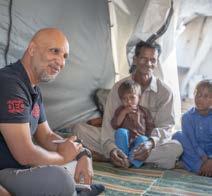
Cover: Sukha receives hygiene items from a DEC member charity in Sindh. Since losing their home and belongings in the floods she and her husband have been living without shelter. ©

Pakistan is among the top ten countries most affected by climate change3. It has seen changing weather patterns, more frequent and more severe storms and coastal rains, glacial melt and lake outburst flooding, sea level rise, loss of biodiversity, droughts and formerly fertile land becoming desert.4
Between June and August 2022, Pakistan was affected by one of the most severe floods the country has ever seen. Lives were lost and homes were destroyed. The floods also caused enormous damage to infrastructure, submerging villages under floodwater, and destroying livelihoods. Nearly 900,000 houses were destroyed and 1.4m houses were badly damaged.
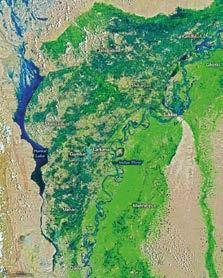
The Government of Pakistan estimates that the floods will increase the national poverty rate by up to four percentage points, pushing between 8.4 and 9.1 million people into poverty.5
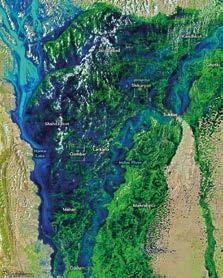
By October 2022,6 the Government of Pakistan declared 94 districts, accounting for over half of all districts in the country, “calamity hit.” The majority of these districts were in the provinces of Balochistan, Sindh, and Khyber Pakhtunkhwa (KP). Out of the 25 poorest districts in the country, 19 were affected by the disaster.3
The floods destroyed extensive areas of crops and killed over a million livestock, adding another element to the long-term impact of the disaster as agriculture represents the main source of income for many communities in the affected areas. Food stores have been destroyed and fields will not be ready for the next planting season, increasing the risk of further food insecurity. In Sindh and eastern Balochistan, many people who have been able to return to their villages, found that water sources are still contaminated –forcing people to travel much further to access safe water.
The DEC Pakistan Floods Appeal was launched 1 September 2022 to provide immediate and medium- to long-term assistance to those most affected and built on learning from the 2010 DEC Pakistan Flood response. For this appeal, DEC funding contributed directly to meeting basic needs by providing shelters, food and other material assistance, along with cash assistance (see box on page 7), and by deploying mobile health teams and emergency water, sanitation and hygiene facilities to ensure people had access to primary healthcare and safe water.
When faced with images of devastation caused by the widespread flooding in Pakistan, the British public, businesses and community groups responded generously despite the cost-of-living crisis in the UK.


33 million
5
7.9 million
people displaced
The DEC’s Rapid Response Network of media and corporate partners sprung into action, and together we raised £46.5 million in the first six months of the appeal.8 Of this, £35.4 million was raised directly by the DEC, including £5 million matched by the UK Government as part of the UK Aid Match scheme. The remaining £11.1 million was raised directly by DEC member charities through their appeals to supporters, using DEC co-branding.
The appeal launched with television broadcasts fronted on the BBC by actor, writer and broadcaster Adil Ray, and by activist and Nobel Laureate Malala Yousafzai on ITV, Channel 4, Channel 5 and Sky. In response, over £8 million was raised for the appeal on the first day alone.
The appeal received support from a wide array of notable figures, institutions and events. Members of the Royal Family including Queen Elizabeth II donated to the appeal, representing one of her last charitable acts.
20.6 million people7 were estimated to be in need of humanitarian assistance
The England and Wales Cricket Board and members of the England Men’s team, together with Sky Sports and BT Sport, helped to raise vital funds and awareness for the appeal during England’s T20 and Test tour of Pakistan.

In the world of comedy, a number of fundraising events were organised in aid of the appeal, including ‘Stand Up for Pakistan’ by comedians Tez Ilyas, Eshaan Akbar, Aatif Nawaz and guests, and a special evening at the Harold Pinter Theatre in London, organised by Guz Khan with Romesh Ranganathan, Riz Ahmed and others.
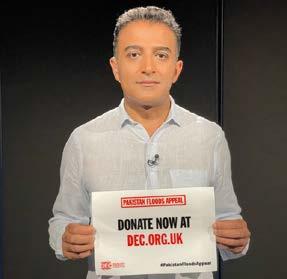
14.6 million people needed emergency food assistance
4 million
children lacked access to health services
5.5 million people without access to safe drinking water
11% £46.5m 25% 64%
2.2 million houses were damaged or destroyed
people (one in seven) affected by floods and flash floods across 94 districts 3
This report covers the funds raised directly by the DEC, of which £11.8 million was spent by DEC member charities in the first six months. The appeal remains open and funds will be spent over a two-year period.
Food Phase 1 expenditure
In the six months following the launch of the appeal, 11 DEC member charities having been using the funds to help meet the needs of hundreds of thousands of people, working both directly and through 23 local partners.
Member charities have been providing emergency food, healthcare, blankets, winter clothes, shelter kits, hygiene and sanitary items and direct cash payments. Work has also begun to restore people’s livelihoods and reduce the risk of future disasters, with an emphasis on long-term recovery and resilience as the response continues.
Helping the most vulnerable has been a priority in the response, with DEC member charities working with local communities to ensure children, older people, pregnant and breastfeeding women and female-headed households receive the help they need.
In many humanitarian crises, markets for essential items like food are still operating. In these contexts, it can be more efficient to give cash payments directly to people in need to allow them to buy what they need. This reduces costs by removing the need to source and ship large quantities of products, supports local markets and traders and gives people the ability to decide how best to meet their specific needs. See page 10
more details.
6%
6%
A total of £28 million has currently been allocated to member charities for humanitarian programmes from the funds raised through the DEC Pakistan Floods Appeal. DEC member charities spent a total of £11.8 million of DEC appeal funds during the first six months of the response (99% of the Phase 1 budget).
In the first six months of the Pakistan Floods Appeal, DEC member charities have delivered the following vital aid:
158,000 people accessed basic health services including maternity services and immunisations
66,400
people were provided with temporary shelter such as tents, tarpaulins and shelter tool kits
18,700 households were provided with essential items such as winter clothes, blankets and kitchen kits
4,200
households were provided with assistance to recover their livelihoods, through distribution of seeds, fertiliser and livestock
16,200
households were provided with cash assistance to allow them to meet their urgent needs
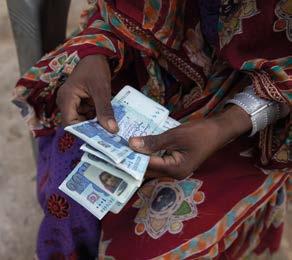
20,000
women or girls received dignity kits containing sanitary pads, underwear, and soap
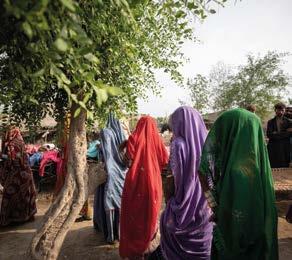
50,400
people received food assistance such as wheat, rice, sugar and cooking oil
25,100
households were provided with hygiene kits containing items such as shampoo, soap, toothpaste and water purification tablets
07 06 Pakistan
for A woman receives Rs.15,000/- (£58/-) through a Multi-Purpose Cash Assistance (MPCA) scheme © Khaula Jamil/DEC Women line up to receive Multi-Purpose Cash Assistance (MPCA) (amounting to Rs.15,000/- /£58/-), Sindh. © Khaula Jamil/DEC“There are 300 or 400 houses in this village and almost all of them were damaged in the rains,” said Jeyand in November 2022. “When the roof of our house collapsed, I took my wife and 16-year-old son to the village mosque. It is built at a slight elevation so we gathered there with more than 100 other villagers for shelter. We lived in the mosque for almost a month. The water then continued to rise until it reached as high as our chests. We fled the mosque as we were terrified and we walked to the nearby roads to escape the water. We lived on the road for around a month.”
A DEC member charity provided shelter kits to 61 people in Jeyand’s village, along with food, household items including blankets and cooking utensils, and hygiene kits.
8,900 tents for families
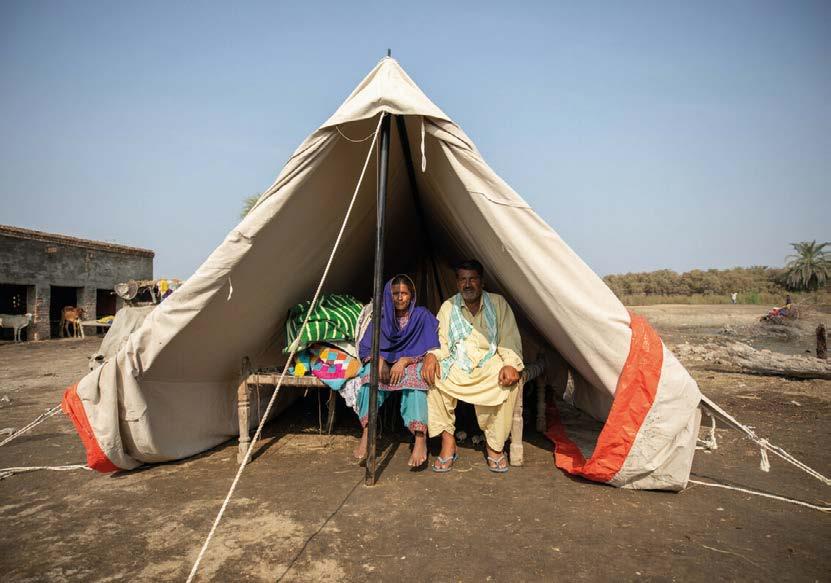
7,800 winter kits containing blankets, bedding and clothes
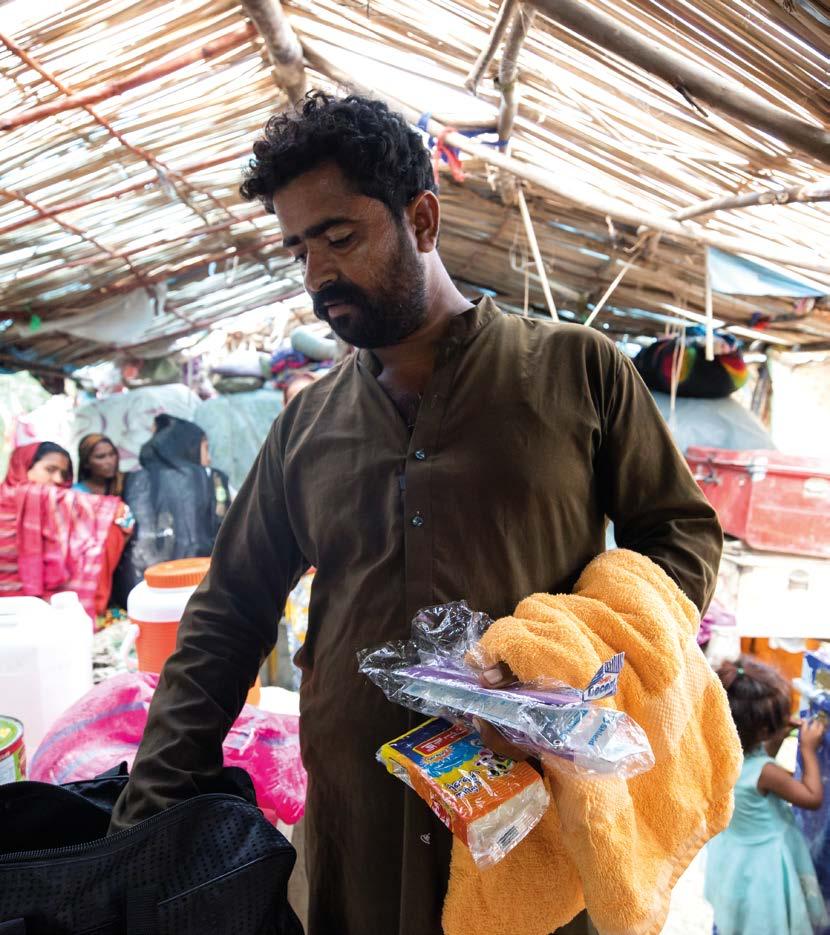
9,800 household kits including mosquito nets and utensils
Heavy rainfall, floods and landslides led to a huge loss of homes, with two million houses wholly or partially destroyed. Almost eight million people were displaced, many for long periods of time because flood waters took weeks or months to recede in some districts. In freezing winter temperatures, people needed emergency shelters and blankets and items to meet their everyday needs such as cooking equipment.
The rebuilding of homes remains an area that people in need have identified as a major priority. There are very few humanitarian agencies working on rebuilding or building new permanent homes despite the high demand due to the lack of available resources and the high cost, which unfortunately means that there are more people in need than funds available.
“We could not fathom how much water gathered. It was three or four feet high,” said Khair Muhammad from Sindh province, speaking in November. “We gathered our belongings and came onto the road for a few days. When we looked around us, we could only see standing water for miles. In the days before, we had prepared our lands for harvesting and then the rains started. It’s all destroyed now, the crop is ruined.”
Khair Muhammad was one of 700 people from two districts receiving a multi-purpose cash grant of 25,000 rupees (£69 GBP) from a local partner of a DEC charity to help meet their immediate needs. The partner had previously visited households in the districts to assess their needs, and has collaborated with Pakistan Post to send future payments direct to their homes.
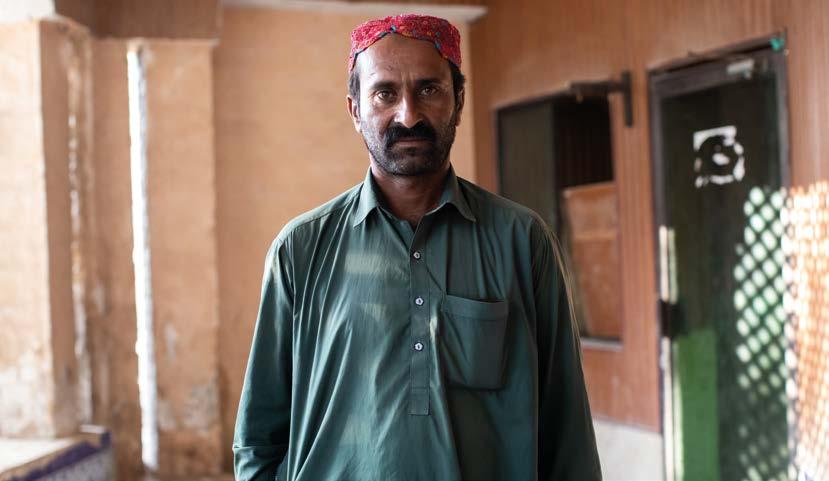
“I had intended to set the money aside to rebuild my shop but things at home are so bad, so that’s where the money will go,” said Khair Muhammad. “We need money for doctors as five members of my family are not well right now, for food and milk for the children, and to stock up for winter. will hopefully be able to reconstruct my shop later.”
16,200 households received cash assistance. In total, £1.6 million was spent on cash and voucher assistance in the first six months of the response.
A survey of recipients of cash support by one DEC member showed that:
food
Cash assistance allows people to take on a more active role in their own recovery and has proved to be a very effective form of assistance in situations where the economy is functioning and markets are open.
Rather than creating dependency on aid, cash assistance builds resilience by enabling families not only to choose what to spend the money on, but also to plan ahead for how and when to spend it. People who received cash assistance said that they preferred it to other forms of support.
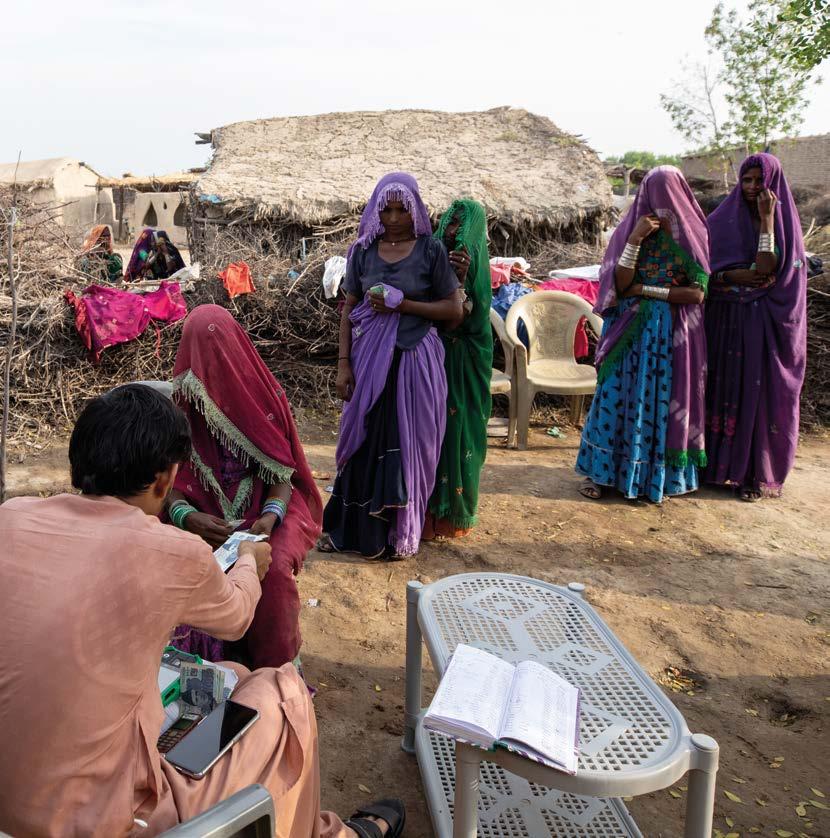
Cash assistance is also particularly helpful for those most vulnerable, such as people with disabilities and older people, whose needs are not always met by traditional aid packages. Cash support gives them the flexibility to pay for the specific
items that they need such as suitable foods, medicines, and fuel for heating. Cash assistance also has lower shipping and administration costs and has a lower carbon footprint than traditional in-kind distributions.
“As per the feedback received from project participants, cash transfers had a significant impact on participants’ lives in a time when they needed it the most,” said one DEC member charity. “It helped them meet their basic food and other essential needs. Affected communities were able to set their priorities and utilise cash for their own needs. Participants also reported cash assistance as a better choice than food assistance as they were able to decide on food requirements and quantities based on each individual household’s size.”
Families were forced to flee their homes with very few possessions. Crops were destroyed and farmland was submerged. Following the floods, many thousands of people were in desperate need of food. “Before the rains we used to have plenty of grain, and enough food to store it or save it,” said Sumar Khan, 65, from Balochistan province. “We used to sell some of our crops and keep the rest for ourselves, but it’s all gone now in the water.”
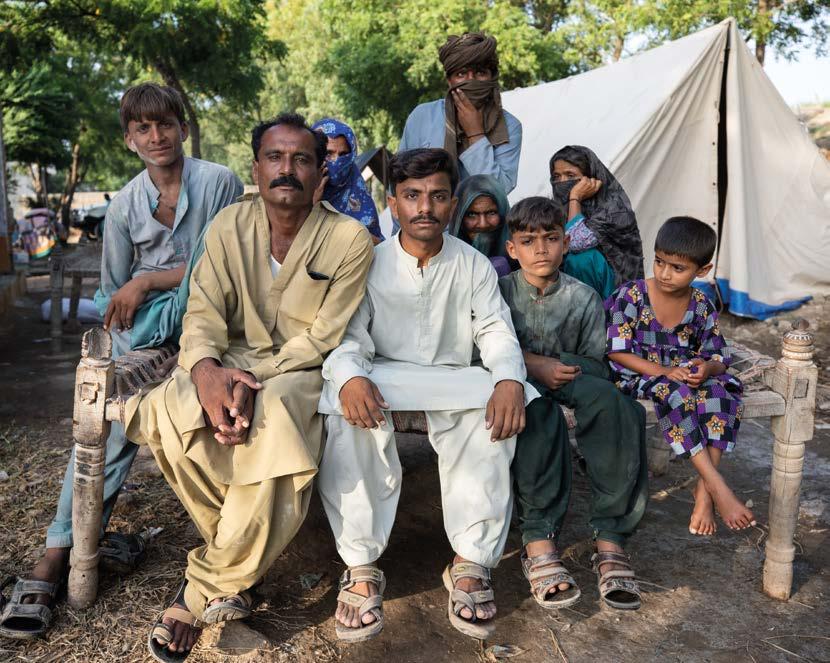
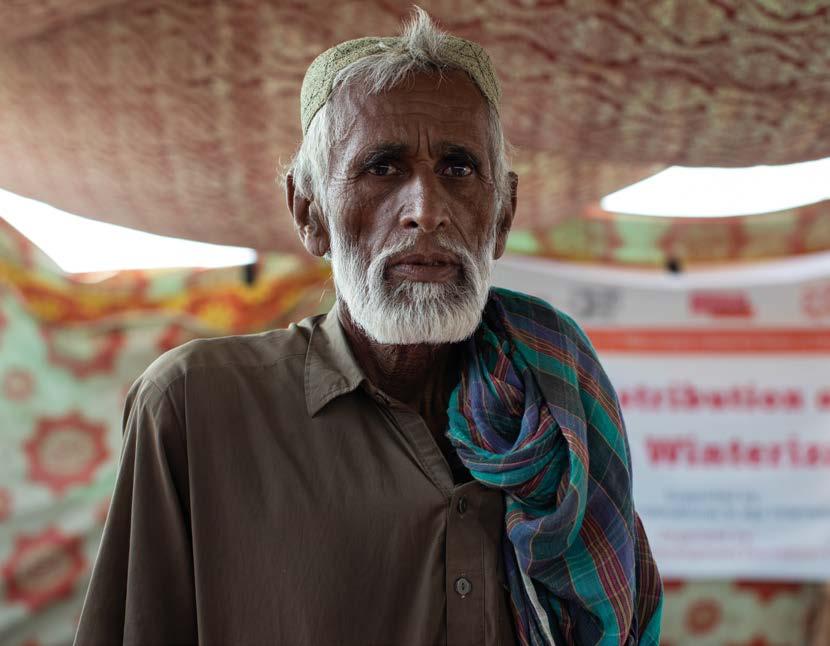
According to an analysis by one DEC member charity, 73% of people were unable to buy basic items and food, due to loss of livelihoods. Getting food to people was therefore an urgent priority for DEC member charities as people were facing emergency-level food insecurity.
In the first six months, 7,200 families severely affected by the floods received food or cash for food. Household food packages contained flour, vegetable oil, pulses, beans, rice, salt, and sugar – in large enough quantity to feed a family of seven people for a
month. DEC member charities ensured that deprived groups such as women, widows, persons with disabilities and child-headed households were included.
Even before the floods, in Sindh province the rates of acute and chronic malnutrition were already high. In the aftermath of the floods both the Government of Pakistan and UN agencies have been highlighting the risk of increased malnutrition as fresh crops were delayed, supply chains were disrupted and food prices in the affected regions increased.
Some DEC member charities and their local partners have already initiated some integrated nutrition projects and will continue to provide support to communities affected by the floods in Phase 2 through the provision of primary healthcare, nutrition services and early livelihood recovery. However, given the huge needs, without further resources a nutritional crisis in Sindh and Balochistan provinces may be difficult to avoid.
“Due to rain and flood, our house and our fields have been damaged,” said Shah Jahan at a food distribution run by a DEC member charity in Sindh province in September 2022. “And we have also become destitute and forced to live on the roadside.” Some of his family’s small number of livestock had died in the flooding, and the rest had been sent to higher ground until the water receded.
“I used to have 20 acres of land. I used to go to college on Mondays, and I used to hang out with my friends. Life was very good.”
“We have benefited a lot because of the food distribution, as all the work we used to do before has been ruined due to floods. We are very grateful to those who have helped us and given us the food supplies.”
Shah Jahan70 year old, Sumar, a flood affected resident of a village in Balochistan, Pakistan, received a shelter kit from a DEC member. © Khaula Jamil/DEC
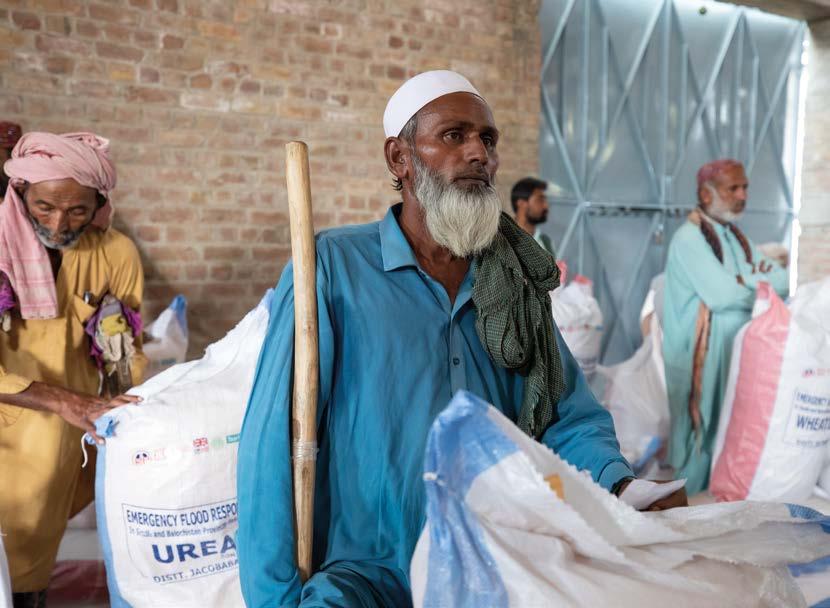
“During the rains, we were living a nightmare,” said Imam Deen, a 40-year-old with a disability at an aid distribution in Sindh province in November 2022. “Our homes were destroyed and our lands had been ruined with the water. We had to leave our homes and find shelter on the nearest roads. We were beneath the open skies with nothing to our names, nothing in our hands.”
Imam Deen was one of 100 farmers with small plots of land receiving agricultural products including wheat seed and fertiliser to help restart their livelihoods through a project run by a local partner of a DEC member charity.

“With the supplies we have received here today, I intend to use the fertiliser to bring my lands back to life,” he added. “And God-willing we will be able to restart our lives if the crops grow well.”
4,200 households participated in projects to rebuild their livelihoods
1,500 households received seeds and fertiliser
750 households received farming tools
450 households received pregnant cows
Small-scale agriculture is a major source of both food and income for Pakistan’s rural population. Supporting people to build climate-smart agricultural livelihoods that balance increasing food production with protecting the environment and mitigating the effects of climate change is therefore a crucial part of a long-term recovery response for people affected by the floods.
This livelihoods assistance was designed to provide immediate benefits – through seed and fertiliser distributions, livestock distributions, cash-for-work or training in climate-smart agricultural techniques and livestock production – while promoting longer-term food security by improving technical skills and building resilience.
DEC member charities set up community-led committees on disaster risk reduction, environmental protection, and responding to the impacts of climate change and training was provided to members. These committees will be able to support their communities to prepare for and respond to future disasters such as droughts and floods.
Some of the participating villages supported by one DEC member charity have initiated seed banks. These are mutually managed by the village development committee formed as part of the project. These seed banks will store some of the seeds from the expected harvest ready to be planted in the next season. These activities will continue to be supported in Phase 2 of the DEC response.
Many of rural populations in Pakistan were facing an acute shortage of safe drinking water even before the floods, as communities relied on groundwater which was unsafe and salty in taste. The lack of safe water sources was further exacerbated by the floods after handpumps were destroyed or damaged.
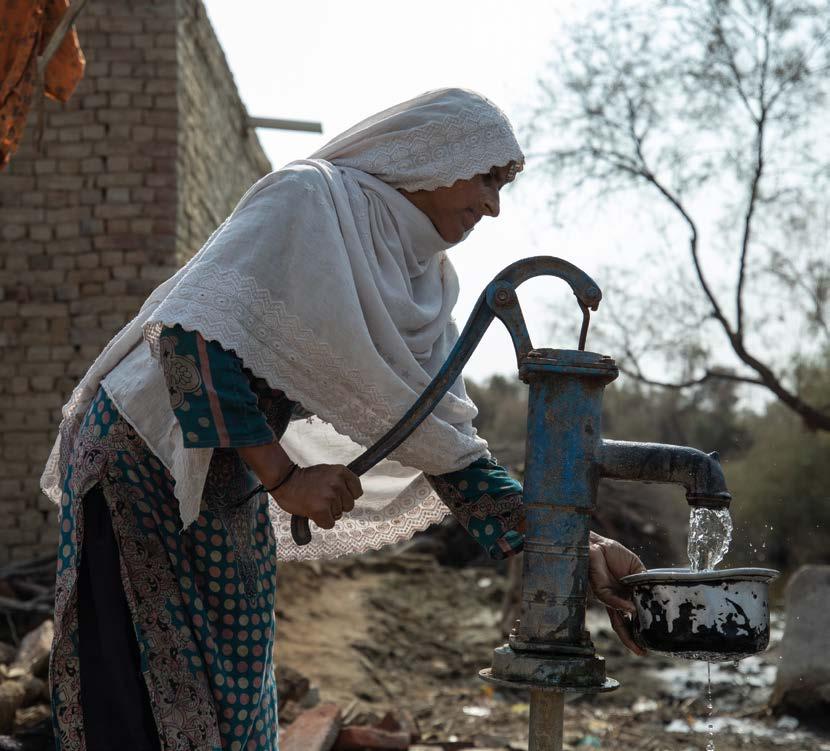
In collaboration with local authorities, DEC member charities have been repairing water points in rural locations where access to safe water is limited. DEC member charities have also helped to revive the establishment of locally led water and sanitation user committees, which will manage and maintain the water points long term.
Moreover, hygiene promoters were deployed and supported hardto-reach areas, engaging women and children through hygiene awareness sessions which were conducted in communities on topics covering nutrition, health, hygiene, use of clean and safe drinking water and its importance for overall wellbeing. Sessions
were delivered in local languages and designed to be engaging and easy to understand. Following these sessions, participants reported that they went to nearby villages to share what they had learned in order to help promote and improve hygiene practices for more people.
To improve hygiene and sanitation, families were provided with hygiene kits containing soap, detergent, toothbrushes and toothpaste, towels, sanitary pads, and a plastic jerrycan to collect water. Mosquito nets were also provided and fumigation sprays were undertaken in some villages.
Muhammad’s house in Sindh province was completely submerged by the floods and he and his family had to live in the open under a tent canvas. A local partner of a DEC member charity supported them from early in the crisis, including with food. “When I came here I didn’t have anything, but [the local partner] gave me rations and supported us,” said Muhammad in September 2022.
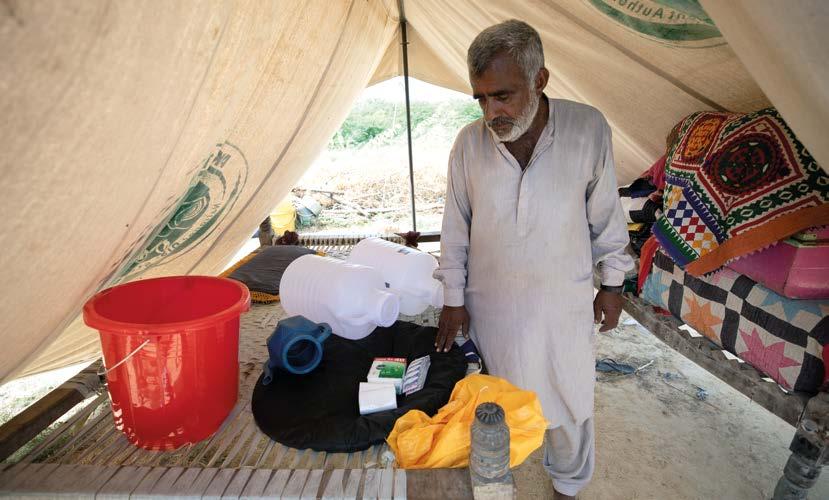
With the support of a DEC member charity, the local partner was now distributing hygiene kits including a bucket, jerry cans, water purification tablets, soap, mosquito nets and other items.
“Because our water was not clean, a child died from a diarrhoeabased disease,” said an aid worker for the local partner. “In the hygiene kit, they were given Dettol Soap with which they can wash their hands. Mosquito nets have been given to prevent malaria, and a water tablet was given with which they could purify the water. All these things have made a big difference and reduced diseases.”
108,000
people provided with access to safe water
25,100 households received hygiene kits
21,100
people participated in hygiene sessions
5,000 mosquito nets were distributed 60 villages fumigated for mosquitoes
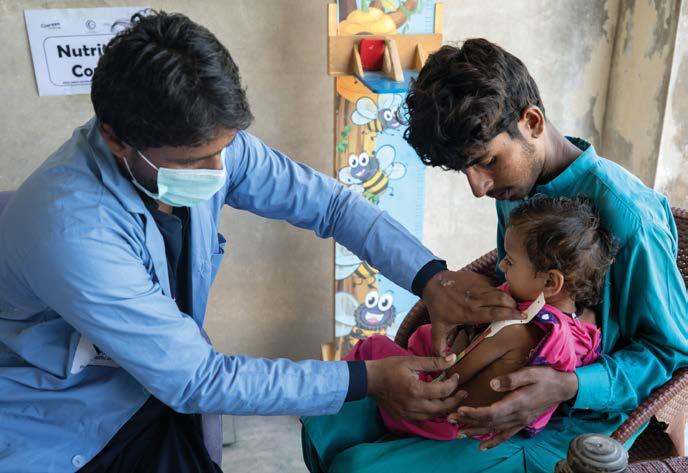
Jhaini went into labour during the first night of the rains. Her husband took her to the hospital by motorbike but after the baby had arrived, they found themselves living on the side of the road, surrounded by floodwater.
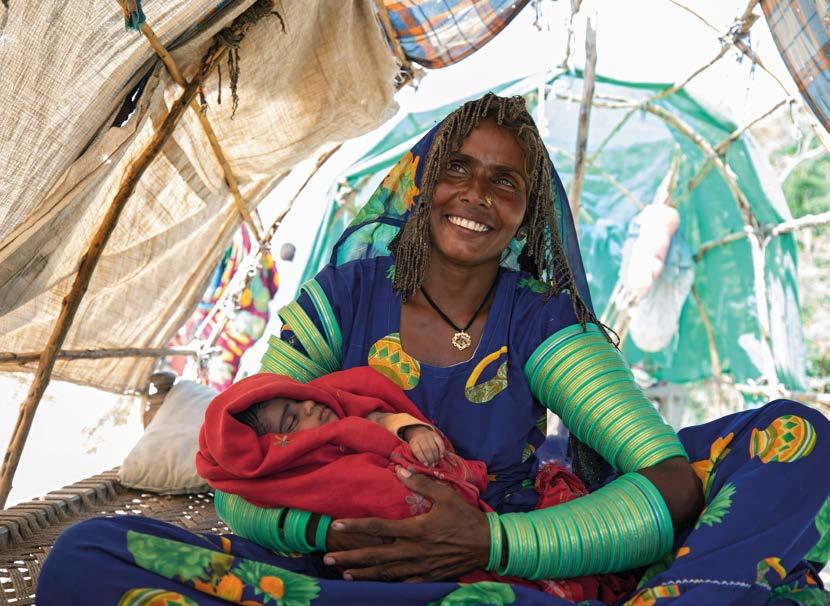
Jhaini and one of her other children had a fever so they came to a mobile health clinic set up by a local partner of a DEC charity.
The clinic provided antenatal and postnatal care to mothers and babies as well as prioritising other vulnerable groups. Waterborne diseases as well as malaria and dengue fever increased due to the floods and a subsequent abundance of mosquitoes.
Many rural communities in Pakistan have extremely limited access to health services – particularly those living in remote areas and those who cannot afford to pay for treatment. Many health facilities were damaged by the floods, and stagnant floodwater, combined with damage to water infrastructure and sanitation, increased the risk of waterborne diseases such as cholera and dysentery and mosquito-borne diseases such as malaria and dengue fever.
DEC funds were used to set up mobile health units targeting displaced communities and people who were unable to access healthcare. The units were staffed and equipped to provide primary healthcare, maternal neonatal and reproductive healthcare, nutrition, and free medicines. Health activities were coordinated with provincial and District Health Departments (DHDs) to make referrals for further treatment if needed. Community leaders were consulted to ensure vulnerable people were aware of and could access the services. In most cases, DHDs provided medical staff including doctors, nurses and ‘Lady Health Visitors,’ who typically provide nursing, maternal and child healthcare and training in rural communities.
One DEC member charity wrote in a monitoring report that: “As the floods resulted in waterborne diseases, skin infections, damages to health facilities, and increasing challenges to access those that were functioning, the medical camps and the
provision of primary healthcare services at accessible locations responded to a dire need of the affected populations and provided much needed relief and support at a crucial time.” They also conducted a survey of people using the services that found that 82% were satisfied with them.
The project identified and addressed factors influencing gender disparities and constraints in health and quality of healthcare, such as access to maternal and reproductive health services. Both female and male staff were involved to ensure that women and girls were able to use the services. More broadly, the training needs of health staff were assessed and appropriate technical training was organised for partners and DHDs to ensure quality services were provided.
In addition, awareness-raising sessions were held in communities on topics such as nutrition and good dietary habits, breastfeeding, use of clean and safe drinking water and its importance for overall wellbeing. These sessions were delivered in local languages and designed to be engaging and easy to understand in order to retain the key messages.
health facilities were establishedNutrition officer, Mehbood Ali, physically examines severely malnourished Saba* with her father Nadeem at a medical camp organised for flood affected communities in Sindh. © Khaula Jamil/DEC 35-year-old Jhaini, with her newborn baby girl Aashi* outside a mobile clinic set up for flood affected families by a DEC member charity in Sindh. © Khaula Jamil/DEC
“
... the medical camps and the provision of primary healthcare services at accessible locations responded to a dire need of the affected populations and provided much needed relief and support at a crucial time.”
DEC member charity aid worker.
Raina, 13, is a student at a tent school set up by a DEC member charity after her school was flooded to allow children to continue their education.


“We study Sindhi, Urdu, and Social Studies, which is my favourite subject,” said Raina, “and Mathematics, which is my least favourite. I am very fond of studying. want to fulfil my parent’s dreams that their children receive an education and I want to bring honour to my family and village by continuing to study for higher education. I would like to be a teacher when I grow up.
“We are happy here in the tent school. When our school was closed we were very bored. In those days we had to live on the roadside as there was too much water in our village. We spent a month and a half on the road. When the waters receded and we were able to return to school, we were happy as we could meet our friends, pass our time, and get our studies done.”
30 safe spaces for women and children
12 child-friendly spaces were established
23,200 people enrolled at these spaces
To ensure the protection and wellbeing of children and women, DEC member charities opened child-friendly spaces and safe spaces for women. Attendees were supported and able to socialise and engage in appropriate activities. A range of services were provided in these spaces including recreational activities, life skills sessions, and health and hygiene sessions, to support participants to learn and adopt positive coping mechanisms.
These places also contributed to bridging the gap between service providers and vulnerable people through directories to inform people of available services, and the development of a referral system. Some member charities’ partners provided individual and group mental health counselling sessions and reached more than 26,000 people. These sessions helped in minimising stress, and other psychosocial problems.
Temporary Learning Centres were also established, to provide children with a safe learning environment. This helped to restore a routine for children and supported them to continue their learning and development.
All these places were improved through the rehabilitation of water and sanitation facilities, including the provision of water
points, clean drinking water, and latrines where needed, to cater for the hygiene needs of vulnerable children and promote good hygiene behaviours.
Some member charities and their local partners distributed protection kits to women, older people, and people with disabilities including items such as a solar lamp, a whistle, a plastic pouch for keeping documents, soaps, toothpaste, and a toothbrush, a radio set as well as a tasbih counter and a prayer mat. These kits had a positive impact and meet protectionrelated needs in emergency situations to protect important documents and maintain personal hygiene, spiritual needs and provide better access to information.
Member charities also held community awareness-raising sessions and radio campaigns to help protect against genderbased violence.
“We see children having so much fun reading.”
Pappu Mal, Vice Principal of the tent school.
No large-scale humanitarian response is without challenges, particularly when responding to such destructive disaster affecting a large area of a country where many people already live close to or below the poverty line. The DEC and its member charities are committed to sharing challenges and learnings to improve the ongoing humanitarian response and future responses. The following challenges emerged during the six months after the launch of the appeal.
Duplication of assistance with other humanitarian actors. Coordination emerged as a significant issue. From the start of the response there was an absence of active coordination systems for humanitarian response at the national, provincial and district levels. In order to avoid duplication, DEC member charities and their partners established close coordination with humanitarian actors through the Pakistan Humanitarian Forum, organised one-to-one meetings, reached out to government district coordination offices, and ensured other humanitarian actors were not providing similar assistance in targeted geographical areas. The establishment of UN-led coordination hubs, which regularly organised meetings where issues around geographical and sectoral overlaps were discussed, largely resolved the initial problems.
Managing high expectations and large numbers of eligible beneficiaries. The scale of the emergency was very large with millions affected, while the overall available support was comparatively small. According to the OCHA Financial Tracking Service, by May 2023 the overall Pakistan Floods Response Plan has received only 43% of the funds required for 2023.9
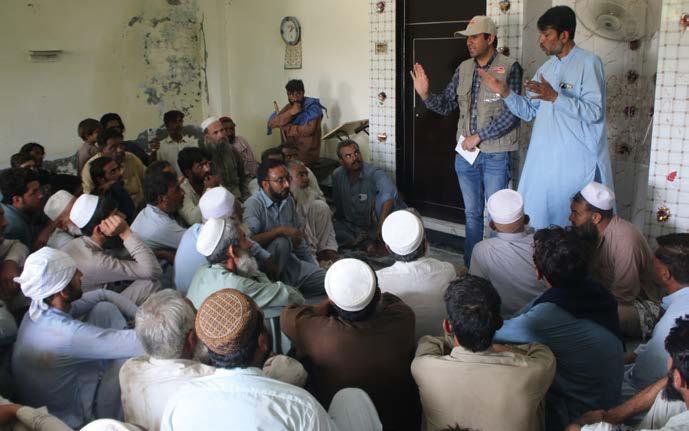
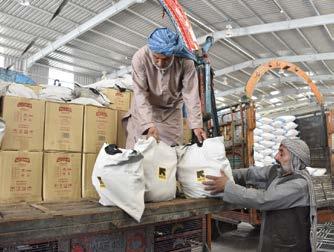
To meet the challenges, DEC members and their local partners have involved a wide range of community representatives in their processes to decide who receives aid and communicated clearly with target communities about the available support and eligibility criteria for receiving support.
Accessibility to the most affected communities. Stagnant flood waters and damage to infrastructure, such as roads and
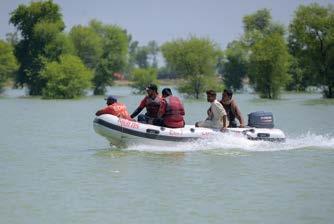
The DEC is committed to using learning from emergency responses to ensure that funds are used appropriately and that programmes meet the highest standards. This aims to ensure that the needs of people affected by disasters are met effectively whilst respecting their dignity. The following sections identify some of the best practice used by DEC member charities in Pakistan to meet this commitment.
bridges, hindered access to people in need of assistance. The transportation of relief goods to the most remote communities took longer than expected. DEC member charities and their partners have had to be agile in adapting to the conditions, for example mobilising boats in order to reach people in need, using volunteers to deliver supplies direct to families who cannot reach distribution points, and setting up mobile health units to take services direct to the communities that need them.
Political and economic instability during the response. Due to a restriction on some imports, there was a shortage of raw materials for pharmaceuticals, which caused challenges in procurement of medicines, medical supplies and equipment. Inflation on imported goods was also an issue, making it difficult to procure commodities like construction items, medicines, dignity kits and solar lamps. DEC member charities mitigated these challenges with existing framework agreements with suppliers or Master Purchase Agreements already available for certain items.
Provision of timely multi-purpose cash assistance to vulnerable households. Whilst cash-based programming was an effective means of providing assistance to vulnerable people, its implementation was complex due to multiple reasons, such as lost or expired computerised national identity cards (CNICs), a lack of physical cash in some remote areas and poor mobile connection. To overcome some of these issues, member charities offered alternative arrangements, including by providing an electronic cash transfer ID to recipients to enable payments to be made through other verified and trusted family members.
To ensure accountability to the affected population and ensure that programmes were meeting their needs, DEC member charities and their local partners continuously engaged the communities they were working with throughout the project cycle, including through rapid needs assessments, project design, implementation, monitoring, and learning workshops. Introduction meetings and focus group discussions were set up with community members – women, men, children, marginalised groups, older people, and community leaders – to explain the project objectives, the types of assistance that would be offered, the criteria for selecting people who would benefit, the required behaviour of staff and volunteers and the main donors.
DEC member charities and their partners put in place multiple feedback mechanisms that were designed to be accessible to
all community members. During project initiation meetings, communities were able to feed into the design of these mechanisms. The mechanisms used during the programme included:
■ Community meetings where space was given for feedback and complaints to be made including the display of banners and distribution of flyers,
■ Feedback boxes placed in accessible locations
■ Helpline numbers and email addresses printed on information, education, and communication materials, tokens or cards, and relief item packaging
■ Face-to-face feedback collection sessions
■ Post distribution monitoring
■ Focus group discussions following distributions
An example of feedback came when a local partner of a DEC member charity received feedback from some beneficiaries with impairments who said that they were unable to get to distribution sites and did not have money for transportation. Based on their feedback, transportation of agricultural inputs to the homes or fields of these beneficiaries was provided.
Aligned with the vulnerable household categories mentioned in Pakistan’s Joint Flood Response Plan10 of the Government of Pakistan and the UN, DEC member agencies had lost their income and livelihoods, and in particular female-headed households, widows, households including pregnant and breastfeeding women, people with disabilities, older people, and ethnic and religious minorities.
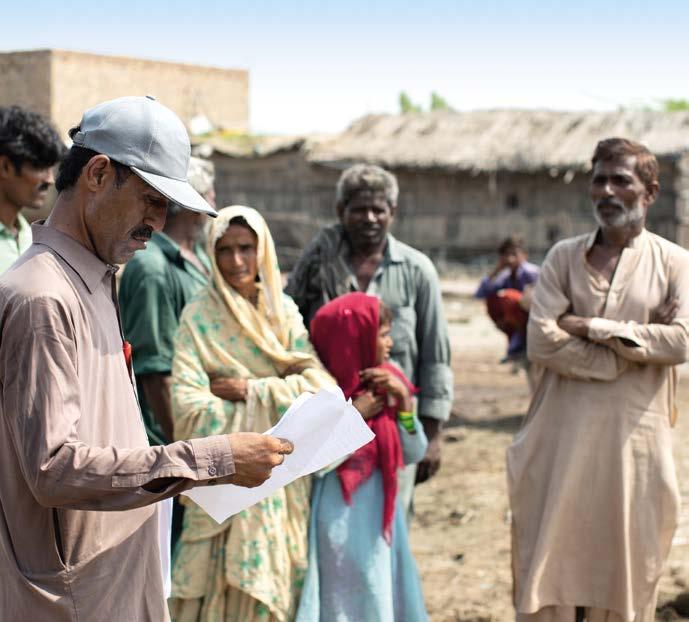
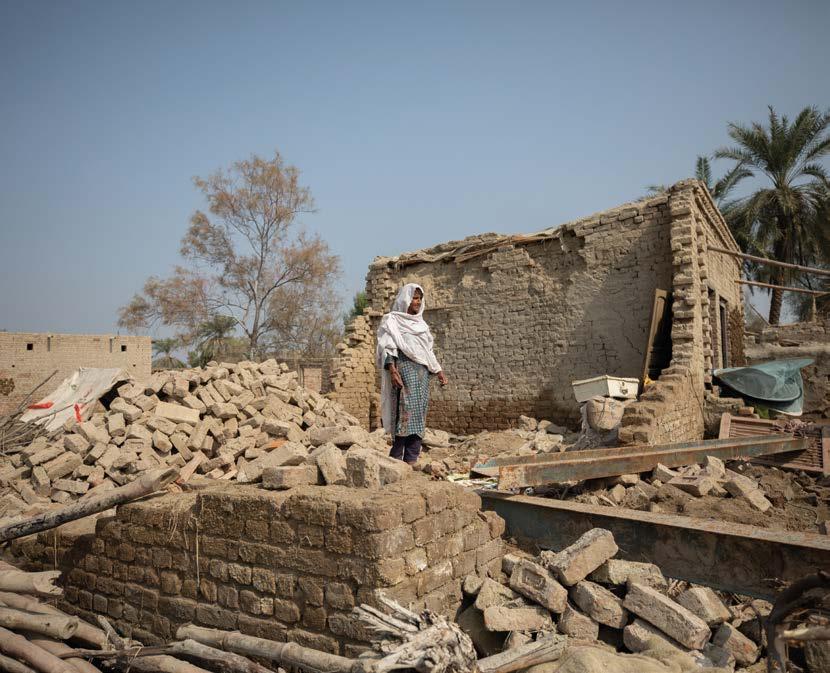
Projects were adapted to meet their needs, for example by designing specific vulnerability criteria for each intervention, providing wheelchairs at the temporary health posts or having latrines wide enough for a wheelchair to access the toilet. Childfriendly spaces and temporary learning centres, mobile clinics and health posts were also made accessible for people with disabilities, including through the provision of ramps.
The response addressed gender concerns through various strategies, including the promotion of gender sensitivity among health service providers, bringing focus on vulnerable and disadvantaged women to improve their health status, and ensuring that women, men, girls, and boys had equal opportunity and access to preventive and curative services. Hygiene kits were gender specific, including sanitary products for women.
Women have also been included in community support forums or committees to maximise their participation in decision-making. DEC members and their partners hired local female social mobilisers and doctors who speak the language and understand the culture.
A total of 23 local partners were involved in the DEC-funded response, along with local authorities and numerous existing community-based organisations (CBOs). DEC member charities focused efforts on providing support and training to strengthen their partners’ abilities to deliver humanitarian aid efficiently. The training covered issues such as safeguarding, humanitarian standards, procurement procedures, community engagement, accountability (including feedback mechanisms), protection, gender and inclusion, and monitoring and evaluation. Furthermore, partners are supported by DEC member charities’ technical staff in all the relevant sectors (Health, Protection, Cash Assistance and so on) through regular mentoring sessions online or at project locations. However, the DEC-commissioned Real-Time Review found that more time and resources should be invested in CBOs, such as village committees, to strengthen their capacities and give them stronger responsibilities in their recovery process. This recommendation has been taken into consideration in the recovery phase of programming.
District Government departments, including Education, Social Welfare and Health were engaged in project implementation and
were directly involved in different activities such as community meetings, field visits, and training. For example, technical training was organised for District Health Department staff to improve the quality of health services and local authorities were also involved in monitoring visits to some of the activities.
Some projects are also being handed over to District Governments when they end where appropriate. For example, one DEC member charity is handing over temporary learning centres to the District Education Departments in June 2023 to ensure continuity and their continued use in government schools.
All local partners already had a presence in their areas of intervention prior to the floods and had already built trust within the communities. This experience facilitated inclusion and participation of local actors, village committees, Water Management Committees (WMCs) and other CBOs during planning, implementation and monitoring of project interventions. This appropriation by CBOs ensured that results are sustainable and that local populations were better equipped to deal with future crisis situations themselves.
DEC member charities recognise that they have a duty of care to all their staff and to all their local partner staff working in this emergency response and have developed different activities to support staff, including:
■ Ensuring that staff are trained on how to prevent, mitigate, and respond to security incidents and respect security policies and plans.
■ Giving access to staff counselling to support the psychosocial wellbeing of the staff and a referral system to further support if needed.
■ Providing training to support personal resilience.
■ Providing awareness to team leaders to ensure that best practices in staff care are utilised to support staff and their families.
■ Overseeing staff health and worksite health and safety policies and services.
■ Encouraging local partners to nominate duty of care focal points and train them on staff wellbeing.
All DEC member charities have robust safeguarding policies in place with zero tolerance of incidents of violence or abuse against children and other people in the communities they serve. All DEC member charities have worked on strengthening their local partners’ internal processes and systems towards ensuring safeguarding measures are in place for the operations. Partner staff were trained on how to handle confidential safeguarding reports sensitively.
As part of the orientation process, all new staff and new partner staff were trained on safeguarding and signed the relevant Code of Conduct. Member charities organised regular
training workshops and review meetings that provide staff with opportunities to enhance their knowledge and skills in humanitarian practice. Further to this, all member charities have a whistleblowing policy that provides guidance on reporting unacceptable behaviour and investigation procedures and processes.
To create a safe and supportive environment for the affected communities they serve, all projects were planned with careful consideration of ‘do no harm’ principles and the protection and safety of the beneficiaries including:
■ Consideration of local social cohesion and dynamics by engaging the community in the selection of aid recipients and ensuring that they understand the selection criteria.
■ Feedback mechanisms to ensure that any activities that cause concern for aid recipients can be highlighted in a timely way and addressed.
■ Consideration of protection concerns in new installations such as collective toilets and child friendly spaces.
■ Close monitoring and adaptability in terms of security considerations.
■ Consultation with communities to ensure that the timing of distributions and other work do not pose any unnecessary risk for the participants.
The DEC-commissioned Real-Time Review found that all member charities have detailed policies on safeguarding communities against sexual and physical harm and these were wellcommunicated to communities during meetings and through banners. All DEC member charities also employed complaint mechanisms to give communities multiple avenues for flagging such abuse.
DEC member charities are aware and conscious of the risks of potential environmental damage through their responses and mitigated them in a variety of ways, for example by procuring reusable or recyclable items in the hygiene, dignity and shelter kits that they delivered or by developing comprehensive systems of health waste management, from the generation of waste to its disposal. Another focus was on community awareness of the environmental impacts of waste disposal.
Some member charities prioritised virtual monitoring via video calls to reduce the carbon footprint of travel and held meetings online when appropriate. All member charities prioritised local suppliers in procurement processes to reduce carbon emissions due to transportation. Fertilisers used in the agricultural inputs were selected to minimise groundwater contamination or pollution.
Nature-based solutions and build-back-better approaches were implemented by some DEC member charities to protect people, property and infrastructure from future hazards. This included the construction of walls to contain flood- and rainwater so that it can be used for the cultivation of crops, and avoid erosion of the fertile soil layer for agricultural land, as well as the organisation of a tree planting campaign in February 2023 which mobilised young people from local villages.
The DEC commissioned a study by the London School of Economics to compare nature-based solutions in the DEC 2010 and 2022 Pakistan Floods Appeals. The study will provide DEC member charities with a guide to best practice in environmental flood response and recovery.
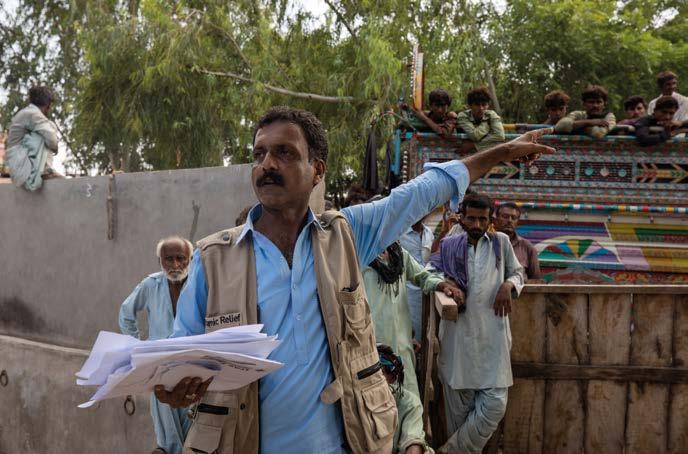
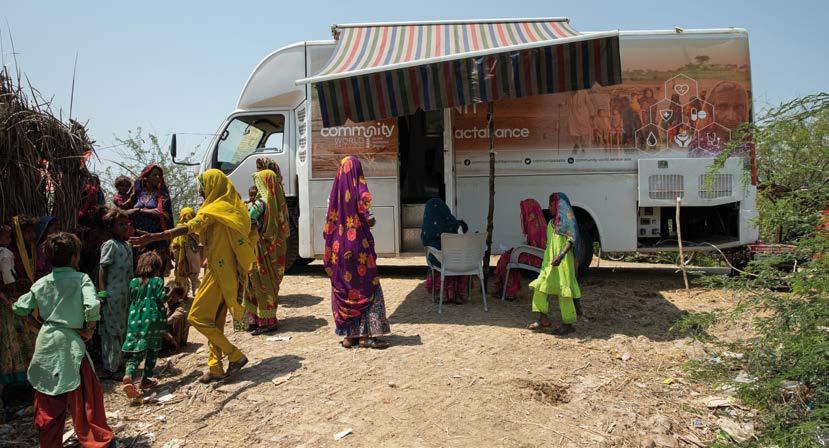
The DEC puts flexibility at the heart of its approach to funding disaster responses, allowing member charities to adjust their planned activities quickly when circumstances change.
Member charities monitored the broader context in which they were working and shared regular updates to aid designing, adapting, and delivering relevant humanitarian programmes. When new needs were identified they adjusted their programming to ensure communities were supported in the best possible way. For example, during a Rapid Need Assessment in November 2022, winterisation kits containing blankets and warm clothing were identified as an immediate need. As a result, a DEC member charity increased its budget for the first six months to support this additional activity. In October 2022, a DEC member charity identified that food needs were higher than anticipated and were able to adjust their plans to support an additional 2,000 households in Sindh province with food rations. Plans were also adapted following feedback from one local partner who reported a high number of acute malnutrition cases and a shortage of medicines and nutrition supplies in some health facilities. In response, six health facilities received ready-to-use therapeutic food, providing treatment for 1,756 malnourished children.
However, the Real-Time Review conducted in March-April 2023 found that member charities could have adapted faster as the situation in communities changed rapidly during the early phase of the response.
The DEC has developed an effective accountability framework to monitor the progress of its member charities, to make adjustments if needed and evaluate the outcomes and the impacts of the response on the affected population.
All 11 DEC member charities and their local partners responding in Pakistan have strong monitoring systems in place including orientation meetings with the local partners and the communities, needs assessments, monitoring and evaluation plans, indicator tracking tools, digital data collection applications, post distribution monitoring surveys, field visits, feedback meetings with beneficiaries, learning meetings as well as reporting project achievements (progress, plans, and challenges) to the beneficiaries, the Government authorities and DEC.
These systems ensured the participation of communities and facilitated joint monitoring missions by engaging all the direct stakeholders to ensure the quality of project implementation and create ownership among all the direct stakeholders.
The DEC secretariat is also committed to making continual improvements and therefore the Pakistan Flood Appeal 2022 response has been built on learning from the 2010 Pakistan Floods.11 As usual, the DEC commissioned a Real-Time Review of the DEC-funded response to this disaster to capture learnings and make recommendations to improve ongoing programmes. Data collection took place in February and March 2023 and involved household surveys, focus group discussions, and key informant interviews. The review found that the first six months
of the flood response (Phase 1) has been relevant, efficient, and effective. Members were able to successfully respond to the immediate needs of communities, mostly related to shelter and food and water, based on the findings of coordinated needs assessments. Coupled with this, DEC member charities demonstrated a strong commitment to accountability to affected populations, through various mechanisms, such as village committees and feedback mechanisms. The review also provided several recommendations for how programming could be strengthened in future. These included improving coordination among DEC member charities to encourage collaboration and knowledge sharing; providing more support and granting more autonomy to local partners; and, improving the monitoring of community needs as they change over time, including those of more marginalised groups within the affected population. These recommendations have been shared with DEC member charities and their partners, and, in several cases, have already been taken into consideration in the implementation of Phase 2 of the response.
The DEC secretariat is also committed to making continual improvements and therefore the Pakistan Flood Appeal 2022 response has been built on learning from the 2010 Pakistan Floods. The Real Time review concluded that learning from the 2010 floods had been applied but the long time gap since the previous floods meant some institutional memory and capacity had diminished. Communities in Pakistan generally reported that agencies had made efforts to learn from their knowledge and experiences.
Extent to which they have been applied in 2022 floods
Provide winter clothing and return packages in Sindh DEC member agencies and partners are providing this assistance in Sindh and other provinces
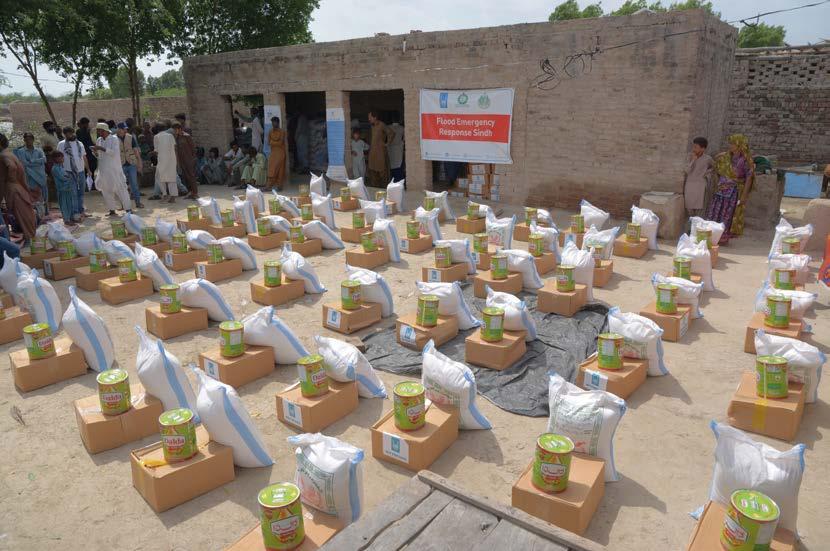
Enhance the use of and build local capacity strategicallyThere has been major progress in the use of local partners and Pakistani staff. Agencies must now focus on greater support to local partners
Develop clearer criteria for targeting of affected groups and villages
There was more accurate and transparent targeting of aid in the 2022 response
Develop interventions in villages based on people’s priorities/ needs There was much greater participation of communities in this response
Enhance coordination with other stakeholders
Engage more proactively with women and other vulnerable groups to enhance protection
Develop clearer communication strategies to enhance transparency and awareness
Undertake advocacy on critical issues
Coordination issues were more challenging in 2022 as the normal cluster system was not activated.
There was greater involvement of women and other vulnerable groups in this response
Agencies used stronger compliant systems
The context in Pakistan has meant that advocacy on key needs has become harder to do.
Facilitate DRR/preparedness at local and regional levelsAgencies had implemented large DRR programmes after the 2010 floods although their efficacy had reduced due to the long time gap and few of the DRR community groups established in 2010 are active.
Enhance the documentation and dissemination of lessons learnt The emphasis on learning is much higher in the 2022 response than the 2010 response with all agencies holding learning events.
The Government of Pakistan leads the flood emergency response operation coordinated by the National Disaster Management Authority (NDMA), Province Disaster Management Authorities (PDMAs), and District Disaster Management Authorities (DDMAs).
All DEC member charities and their partners maintained good coordination with these government departments. This collaboration was critical to granting access permission and ensure that activities complemented the government response and avoiding duplication of efforts.
DEC member charities and their local partners are also members of the Pakistan Humanitarian Forum and/or the National Humanitarian Network and play an active role in sectoral working groups such as Health and Nutrition, Education, Food Security & Livelihood, Protection, Water, Sanitation and Hygiene, Shelter & Non-Food Items, Cash Learning working groups at the national and local levels.
In addition to the PDMAs and DDMAs, at the provincial and district levels, member charities and their local partners established strong linkages and an effective coordination mechanism with government line departments, for example social welfare, education, agriculture, public health and engineering and livestock departments, and district
administrations. Supporting and strengthening, where possible, existing public services to be part of the response is a key factor in the sustainability of the response and ensuring better preparedness for future emergencies.
Finally, all DEC member charities shared their plans amongst themselves including geographical areas of intervention, type of proposed activities, local implementation partners, and compliance with government procedures related to access and priority areas for humanitarian interventions. This synergy between member charities helps to reduce costs, to increase efficiency, and to promote good practice.
The DEC response to the floods in Pakistan will continue for a further 18 months, until August 2024. While DEC member charities will continue to provide shelter, food and multi-purpose cash support to the most vulnerable families, the main focus of the next phase of the Pakistan Floods response will be on community-level rehabilitation of water supply and sanitation infrastructure, provision of healthcare support, recovery of livelihoods, and income generation activities. Prior to the floods, the majority of rural communities relied on small-scale agriculture and livestock farming for their livelihoods. DEC member charities will support communities to rehabilitate their agricultural lands, rebuild their livelihoods using climate-smart agricultural techniques, and develop resilience to future climate shocks through disaster risk reduction and community-level adaptation and mitigation strategies.
In Phase 2, among other activities, DEC member charities will:
■ support the restoration and strengthening of livelihoods through distributions of seeds, tools, cash grants to support livestock and other income generation activities, and training on climate-resilient agriculture
■ provide multi-purpose cash assistance to families
■ support communities to develop and implement disaster risk reduction and climate adaptation plans and strategies, including supporting tree-planting initiatives to mitigate future flood impacts

■ rehabilitate flood-damaged health centres, supporting mobile health units and training medical staff to provide primary healthcare, free medicines, and neonatal and child health care
As reported in the Real-Time Review, there was a lack of preparedness for the flooding contributing to the scale of damage and loss experienced. The second phase of the response (from March 2023 to August 2024) will include a focus on strengthening resilience and preparedness for future emergencies, and building capacities amongst communities to find dignified, acceptable solutions to their problems. Inclusive early warning systems will be developed and strengthened to provide information at the community level to ensure that the most vulnerable people are informed and prepared for disasters. Member charities’ future interventions will develop build-backbetter approaches in accordance with the Government of Pakistan’s strategic policy, the Resilient Recovery, Rehabilitation, and Reconstruction Framework (4RF).
“This waterway we are building will help distribute water to these lands and help the crops grow. Our animals will also benefit from this. The [local charity of DEC member] encouraged us to form a committee and to come together as a village. Our village committee told us that we all needed to work together to make some plan for future rains. So we have decided that we need to make homes that have iron-clad foundations and with solid bricks, not mud ones. The homes that we usually make out of mud will not survive any rains. That is what we need for the future.”
Ayaz Ali
